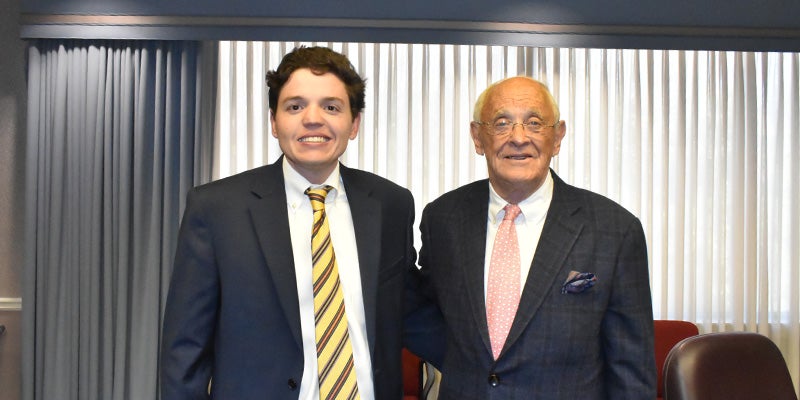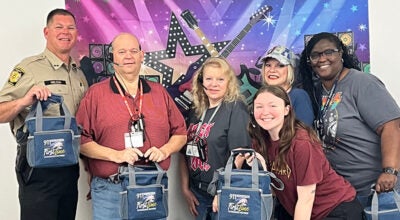Gerald Dial reminisces on four decades of political service
Published 9:00 am Friday, March 24, 2023
|
Getting your Trinity Audio player ready...
|
WEST POINT — Gerald Dial was the guest speaker for Thursday’s noon hour meeting of the West Point Rotary Club. First, as a state representative, and later, as a state senator, Dial served the people of Chambers, Randolph and Clay counties for more than four decades. He told the gathering he is having good retirement by staying active as a member of the Troy University Board of Trustees and being a spokesman for an Alabama-based organization known as Healthy Heroes. He’s 85 now but has the energy of a much younger person. He still has the quick wit he has always been known for.
Dial left the state legislature in 2018. Since then, he said the divisions between the two political parties have become much more pronounced than they were when he was in the legislature. He served a portion of his time in office as a Democrat and a portion as a Republican. He said he was always open to working with members of the opposition party if it was for the benefit of his district and the state. Doing that now is looked at by some elected officials as near treason, he said.
While serving in office, Dial was accustomed to fielding tons of phone calls.
“Those phone calls stop coming when you retire, and I miss it,” adding jokingly that he would strike up a conversion with a telemarketer if he ever got one to call the county commissions.
There can be some drawbacks to holding elective office.
“I’m from and still live in Clay County where people are always friendly to each other,” he said. “When someone who knows you recognizes you they will always throw up their hand and wave. Sometimes, especially if they don’t like something government is doing, they may hold up just one finger when they are waving at you. Since I have retired I’m back to getting that five-finger wave, and it’s much better than it once was.”
That comment got a round of laughter from the Rotarians.
Dial had a long career in the National Guard, rising all the way to brigadier general.
“If you stay in and do what you are told you will rise in rank,” he said. “I enjoyed my service to my state and country. The hardest thing I ever had to do was to give a folded flag to a widow whose husband had died in service.”
He said he’d never forget coming to the Valley to campaign in the 1980s.
“I would meet so many good people at the mill gates,” he said. “A lot of them would tell me their parents or grandparents were from Clay or Randolph counties and that they had moved to the Valley to work in the mills.”
Dial said it was painful seeing all the textile jobs go.
“We once had a Higgins Slacks plant in Clay County,” he said. “It provided good jobs for our community, but it was devastating when the plant closed. It was worse in the Valley when lots of mills shut down.”
Dial and other members of the local legislative delegation knew they had to do something to bring new jobs to the east-central Alabama region. One way was through a tobacco tax. When the legislature passed a statewide tobacco tax it left a gap between what the new tax would bring in in a local area and what the county had been getting in a local tax.
“We were able to capture that tax and direct it to local needs in Clay, Randolph and Chambers counties,” Dial said. “We were able to direct some of that money to the county commissions, local volunteer fire departments and to an industrial development authority in Chambers County.”
That organization is now known as the Chambers County Development Authority.
“Valerie Gray and her staff have done great work in bringing new industry and businesses to Chambers County,” Dial said.
Dial said he was quite proud to have worked with Healthy Heroes.
“It bothered me for years that so many high school students drop out of school and never earn a diploma,” he said. “I’ve studied this a lot and found out that one reason is that a student may have an extended illness and fall way behind in their school work. They get discouraged, feel like they can never catch up and quit school.”
One of the main culprits in this is the flu.
This motivated Dial to have flu shots in the schools. At first the Alabama Department of Public Health was reluctant to get involved. It would be a massive effort to do this in all 67 counties. Dial looked for a way to do this and found a solution. A pharmacist from Union Springs, Alabama and some nurses agreed to have a trial program to do this in Clay County. On the day they arrived, lots of news media was there to cover the story and reports of it went statewide.
“The shots were free,” Dial said. “Insurance would pay for some of the students and Medicaid for the others. We called it Healthy Heroes. From that small start, the program covered 65 of the state’s 67 counties by 2019. That year not a single school in the state had to shut down because of a flu outbreak. This program has been extremely successful. Something that started in Alabama is now in 18 states. I love talking about it.”
Dial also likes to talk about his alma mater, Troy University.
“It’s a beautiful campus,” he said. “We believe that if we can get a student in for a visit they will love to go there.”
A female student from China broke through a glass ceiling at Troy.
“She came at a time when China would not allow their kids to graduate from a college in the U.S.,” Dial said. “This girl was from a prominent family, loved student life in Troy and wanted to graduate. She got involved with a Baptist student group and became a Christian. She graduated and has gone back to China to be involved with her father’s business. He owns the largest necktie manufacturing plant in the world, and she will one day run it.”
Dial remembers a lot of early morning drives to the Valley.
“I had to leave at 5 a.m. in time to get to radio station WCJM in West Point to talk to Terrell Whaley on his early morning radio show. I would sometimes take some abuse, but it was a way to stay in contact with the people. In coming here today I drove by the cemetery where he is buried. I admit to speeding up a bit for fear that he might reach out and grab me.”
That got another round of laughter.
After serving under several governors who had their share of troubles, Dial said one thing he’s most proud of is the fact he was never the subject of a single ethics complaint.
When it comes to school consolidation, Dial does have some advice for Chambers County: do it; don’t let this opportunity get away. Dial said he has witnessed this become a spectacular success in Clay County.
“Sports Illustrated once rated the rivalry between Clay County High in Ashland and Lineville High one of the most heated small-school rivalries in the country,” he said. “When Governor Bob Riley (a Clay County native) asked me to come up with a plan to consolidate the schools, I was reluctant to get involved with something like that.”
A local committee was formed to study this and a vote was held to start the process. It passed.
The schools in Clay County had gotten in bad shape over the years. It would be extremely difficult to come up with the money to build two new high schools, but one centralized school would work nicely for both towns.
Since consolidating, Clay Central has won two 5A state championships in football, and the larger school offers programs in art, languages, music and outdoor sports neither of the two old high schools could provide.
“We are offering the same kinds of programs students at schools in Vestavia Hills and Mountain Brook are receiving,” Dial said.
“Don’t let distance be a constraint,” Dial added. “This is not the horse and buggy era. Transportation within counties is rapid now.”
Dial said that consolidation might need to include Lanett, too.
“Think in terms of what’s best for your kids, your grandkids and future generations,” he said. “Do what’s best for them.”
Club member Greg Duffey said that one thing that has been holding Chambers County back is its aging school buildings. The main building at Valley High went up in 1939 and the main portion of LaFayette High in 1928.
“The staff of the CCDA has told me that the first thing people look at when they come here is your school buildings,” Duffey said. “If they are not impressive they will go someplace else. Your educational system is important for future growth.”



